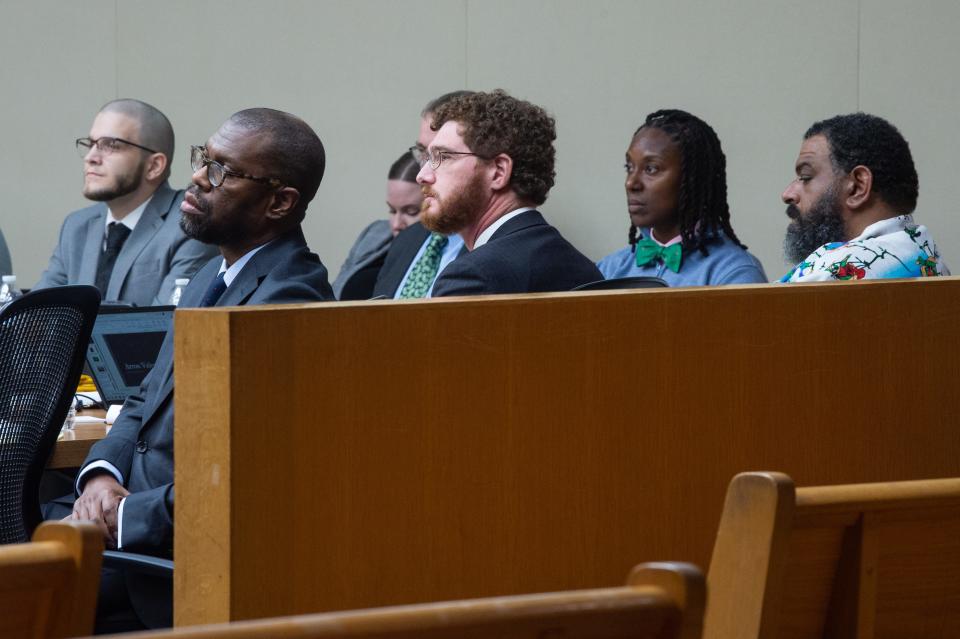In early April, when former President Donald Trump was arraigned for the first time, in New York City, a small pro-Trump protest took place outside the criminal courthouse in lower Manhattan. Leading up to the day, there had been concern about what a crowd of election deniers and conspiracists might do when their hero leader was brought before a judge. The N.Y.P.D. had set up barricades and closed off streets around the courthouse. Security in the building itself was jacked up to fortress levels. In the end, though, the pro-Trump crowd was small, and the mood was mellow. Marjorie Taylor Greene, the Georgia representative who supports Trump and opposes Jewish space lasers, stopped by and gave a forgettable speech. Jordan Klepper, the former “Daily Show” correspondent, trawled the crowd, interviewing an older woman wearing an American-flag scarf, who was incensed by how much the city had lately reeked of weed. The only moment in which anyone appeared at risk of physical danger was when the Republican congressman George Santos showed up, and dozens of reporters stampeded toward him, thrusting their cameras and microphones in his smirking face. “Guys, guys!” Santos said, delighted. “You’re pushing me!”
By then, Santos, the U.S. representative for New York’s Third District, was already a laughingstock. In December, the Times reported that he had embellished much of his résumé on the campaign trail: he sold himself as the striving son of immigrants, which was true, but also as a responsible, seasoned professional with experience both on Wall Street and in the nonprofit sector. A series of impossibly stupid revelations followed. (E.g., “Santos Was Charged with Theft in 2017 Case Tied to Amish Dog Breeders.”) Then questions turned more pointed. (E.g., “Scrutiny Turns to George Santos’s Campaign Funding.”) Santos insisted that he’d done nothing wrong, but it soon became obvious that his political career, and perhaps his entire existence, was unsustainable. In the scrum outside the courthouse, at Trump’s arraignment, members of the media tried to bait Santos, referring obliquely to different chapters in his strange, fabricated life:
“George, we want to hear about your volleyball career!” someone shouted.
“Are the Russians paying you?” another asked.
“Are you going to Ground Zero?” a third called out.
“This isn’t about me,” Santos said. “You guys should focus on the story.”
“What’s the story?” a fourth voice called out, exasperated. “What’s the story?”
I thought about that question this week, before the House of Representatives finally expelled Santos, in a vote on Friday. Santos had survived two earlier expulsion votes; he is only the third representative expelled from the House since the Civil War. He’ll also go down in history as the first openly gay Republican to win a House seat as a non-incumbent—a fact that attracted some modest public interest when he won, in November, but nothing like the circus that followed. Why did anyone pay such attention to this bizarro Mr. Smith gone to Washington? Why did they care about the strange tale of George Santos? Here’s a theory: focussing on Santos was a way for Democrats to console themselves after their surprising defeats in New York State in 2022. Last year, the state Democratic Party lost control of the decennial redistricting process, blew a bunch of close races, and helped hand control of the House of Representatives to the Republican Party. The story of a con man who won a freakish election by hoodwinking everyone around him was easier to take than one about complex political dynamics and bad decision-making in the suburbs of Long Island and the lower Hudson Valley.
In this telling, Santos is a caricature of American political dysfunction, a serial fabulist who sought power to assuage unfathomable internal inadequacies, and who achieved it only by accident, because the rest of us were not paying enough attention. (It’s worth remembering that a small newspaper on Long Island called the North Shore Leader broke the story of Santos’s falsehoods before the election, but no one reads local news anymore.) The absurd variety of Santos’s lies, and their essential meaninglessness, was another plus. Santos told donors, for instance, that he’d helped produce “Spider-Man: Turn Off the Dark,” one of the most accursed flops in recent Broadway history. He told the chair of the Nassau County Republicans that he’d been the “star” of the Baruch College volleyball team. His campaign bio stated that his grandparents, who as far as anyone can tell were born in Brazil, “fled persecution during WWII.” American politics lately has been full of complicated, multiyear story lines intelligible only to paid professionals or fanatics. Santos’s situation was as baroque as any of them, but it could safely be ignored by the public, and even by Santos’s colleagues in Washington. Early last year, there were worries that Santos would become the latest twisted face of the Freedom Caucus, the radical Republicans achieving power and influence by gumming up and embarrassing the House of Representatives. Pretty much anything goes in the Freedom Caucus. But, even among insurrectionists, nihilists, and would-be autocrats, Santos proved to be too much. As his behavior grew more erratic—in recent weeks, he’s taken to walking the halls of Congress holding an unidentified baby—few in Washington remained at Santos’s side. As novel as he was, Santos was also a kind of throwback figure to a time when political scandals were contained, and didn’t threaten the foundations of the entire country. It’s been too easy for notoriety to translate to power recently. It’s reassuring that Santos couldn’t pull off the trick.
In May, a few weeks after Trump was arraigned, federal prosecutors brought charges against Santos related to campaign-finance shenanigans. He’s alleged to have spent campaign donations on Botox, OnlyFans, and credit-card-debt payments. (He has pleaded not guilty.) Several of his former aides and associates are reportedly coöperating with the government. He’ll soon be little more than a footnote, a piece of historical trivia. “Are you finally bringing legitimacy to this process?” Jordan Klepper asked Santos in April, outside the Manhattan Criminal Courthouse. Santos was wearing a light-gray suit and dark sunglasses, and his hair was combed over the top of his head in a way that only accentuated his bald spot. “I am here to support the President of the United States, who is being unfairly attacked,” Santos replied. Maybe it was the proximity of so many Trump fans in costume, but it occurred to me in that moment that what Santos was doing was cosplaying as a politician, nothing more. Even the most cynical members of the federal government failed to arrange a useful role for such a dolt. The public found a role for him, though. For nearly a year, as wars broke out and raged around the world; as a former President faced criminal charges for the first time, while running for President on a platform of political revenge; and as economic expectations did loop-de-loops, Santos was American politics’ comic relief. He played the part beautifully. And, just as quickly as he appeared, he’ll vanish. ♦
Signup bonus from





